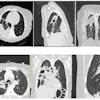Yiping Han, Ph.D., an associate professor at the Case Western Reserve University School of Dental Medicine, plans to use a five-year, $1.85 million grant to better understand how to stop a common bacterium that's harmless in a mother's mouth but can turn deadly when it reaches an unborn child.
This is Han's second National Institute of Dental and Craniofacial Research RO1 award. She's published more than 10 papers from previous research related to the bacterium, Fusobacterium nucleatum.
Among other things, she has discovered an adhesin protein molecule, called FadA, in the genes of F. nucleatum. This adhesin, or binding agent, on the bacteria allows them to connect with receptors on epithelial cells in the mouth and later the endothelial cells of the placenta.
In tests, bacteria without FadA had less binding capability compared to those with the adhesin, Han and a team of researchers report in the July issue of the journal Infection and Immunity (July 2009, Vol. 77:7, pp. 3075-3079).
"With this new grant, we will be able to continue a functional analysis of FadA," Han said in a press release. Her research group will look at the binding agent and also the receptors on the host epithelial and endothelial cells that promote the binding of the oral bacteria.
"In some way, the receptors on the host cell activate a signal that puts into action a cascade of processes that allow the bacteria to penetrate the epithelial and endothelial linings and then colonize," she said. "We want to block the bacteria before it can do any damage. It's an upstream approach to go back to where the whole process begins and stop it from starting its destruction."
Once it leaves the mouth, the invasion of the bacteria through the placenta allows the bacteria to multiple rapidly in the immune-free environment that protects the fetus from being rejected by the mother's body. The rapid bacterial growth causes the placenta to become inflamed. In turn, the inflammation can trigger preterm birth and fetal death.
This research into the mechanisms of bacterial transport has the potential to prevent preterm and stillborn births, and it also may have implications in preventing periodontal disease, according to Han. Periodontal disease has been linked to such health problem as arthritis, diabetes, and heart disease.
Copyright © 2009 DrBicuspid.com



















